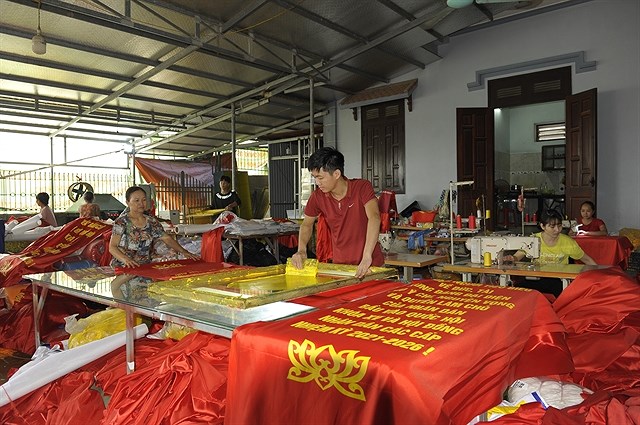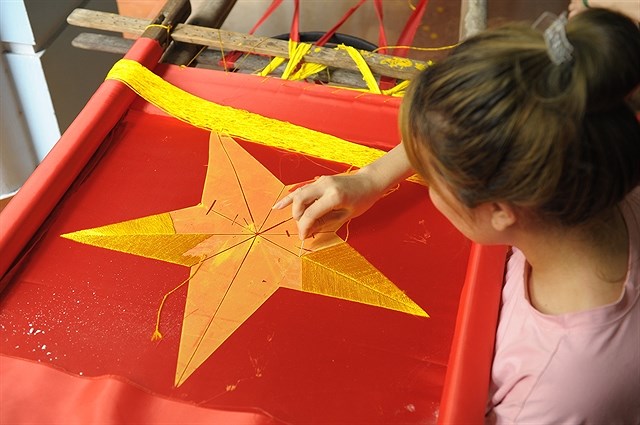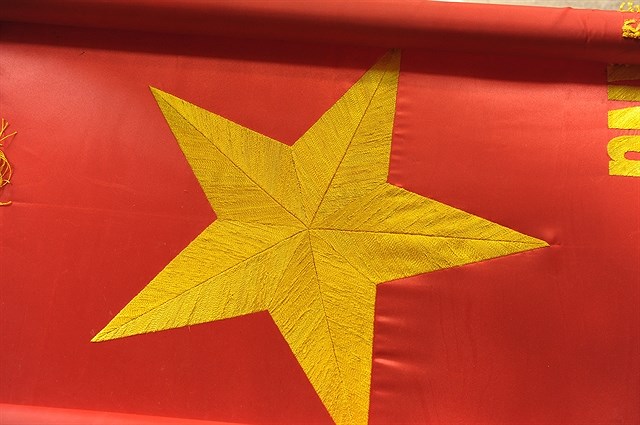As the election of deputies to the National Assembly and People's Councils at all levels for the 2021-2026 tenure is approaching, people in Tu Van Village in Thuong Tin District on the outskirts of Hanoi are busy making national flags to meet orders from across the country.
 A workshop in Tu Van Village is seen busy at making the national flags and banners in preparation for the upcoming general election. (Photo: VNA)
A workshop in Tu Van Village is seen busy at making the national flags and banners in preparation for the upcoming general election. (Photo: VNA) - As the election of deputies to the National Assembly and
People's Councils at all levels for the 2021-2026 tenure is approaching,
people in Tu Van Village in Thuong Tin District on the outskirts of Hanoi are
busy making national flags to meet orders from across the country.
Located
30km south of Hanoi, the trade village is famed for its embroidery and weaving
and has made millions of national flags over the last 75 years.
According
to local elderly people, embroidery and weaving first prospered in the
village in the 16th century. Many of the villagers even opened shops on Hang Bong
and Hang Gai streets in Hanoi’s Old Quarter.
 The tailors need to be meticulous in their work to make sure each flag complies with regulatory requirements. (Photo: VNA)
The tailors need to be meticulous in their work to make sure each flag complies with regulatory requirements. (Photo: VNA)
Ahead
of the General Uprising on August 19, 1945, local craftsmen were asked to make
national flags, with this historic moment marking the establishment of the
national flag-making craft in Tu Van Village.
With
the development of the market economy, many households in Tu Van Village have
switched from traditional embroidery to specialising in making flags, panels
and banners.
Orders
were sent to the village earlier this year in preparation for the upcoming
national election, with nearly double the number of the previous year.
Therefore,
all stages of making national flags from choosing fabrics, operating machines,
printing, embroidering and sewing have been implemented urgently to meet high
demand.
 The five-pointed yellow star is embroidered manually. (Photo: VNA)
The five-pointed yellow star is embroidered manually. (Photo: VNA)
“We
all feel happy and proud when our products, the national flags, are hung
solemnly in many institutes across the country, even though the work is hard
and the income is not high,” said Nguyen Thu Phuong while rapidly but
accurately embroidering the five-pointed yellow star on a national flag.
A
complete national flag involves dozens of steps that do not require much skill,
but the tailors need to be meticulous in their work to ensure each flag
complies with regulatory requirements.
According
to experienced tailors, the steps of printing, placing and
embroidering the five-pointed star on the cloth are the most important. For
them, the national flag represents the soul of the nation so the step is
performed with high concentration by skilled tailors.
Whether
the flag is tens of square metres large or as small as a palm hand, the
five-pointed yellow star must be placed in a solemn position with the most
harmonious proportion.
"We
have to work with enthusiasm, maximum ability and technique to make the
most beautiful flags," said Nguyen Van Phuc whose family
has been in the trade for three generations./.